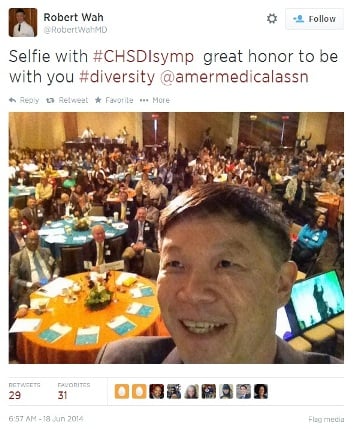One of my recent stops in my busy traveling schedule as AMA president was Charlotte, North Carolina, where I had been invited to participate in the 12th annual Diversity Symposium hosted by Carolinas HealthCare System. I joined physician leaders from the National Medical Association, Chinese American Medical Society and National Hispanic Medical Association for a panel discussion of how to enhance culturally competent care.
I was able to share some of the good work the AMA is doing to promote diversity in the health care workforce. The AMA Minority Affairs Section’s Doctors Back to School program, for instance, connects practicing physicians with schools in underserved areas of their communities. A recent event paired more than 50 medical students with nearly 600 inner-city kids in Chicago’s South Side during the 2014 AMA Annual Meeting.
I also highlighted our work with the Commission to End Health Care Disparities, which recently realigned its strategic goals to improve accuracy and reliability of data collection and reporting for such vital elements as patient race, ethnicity and preferred language. The hope is that better data from ambulatory settings will help physicians zero in on health care disparities, including diseases such as heart disease and type 2 diabetes that disproportionally affect certain minorities.
As an OB-GYN, I made a point to discuss gender diversity, too. Some data suggest gender bias may play a role in medical decision-making, and social attitudes toward women may unintentionally play out in care. It’s crucial that women be represented in studies and clinical trials as well.
Shining the spotlight on diversity helps us as physicians ensure we are an accurate reflection of the population we serve. It also gives us a broader spectrum of backgrounds and experiences, uniting us in a common purpose—improving health care. As the AMA’s first Asian-American president, I’m proud to serve on one of the association’s most culturally diverse Board of Trustees.
As physicians, we’re leaders in our communities, and we serve as role models. Several young physicians approached me at the 2014 AMA Annual Meeting to let me know that my success has inspired them and helped them know they also can achieve their goals.
That’s one of the reasons diversity in health care is so important: Younger generations need to know they can enter this profession and make a difference, regardless of where they are from or what their backgrounds may be. I’m looking forward to continuing our work with the varied voices of AMA leaders and physicians across the nation to improve the health of our culturally diverse nation.




